新视野大学英语四第十单元XI,XII.翻译
新版新视野大学英语读写教程第四册课文翻译(完整版)
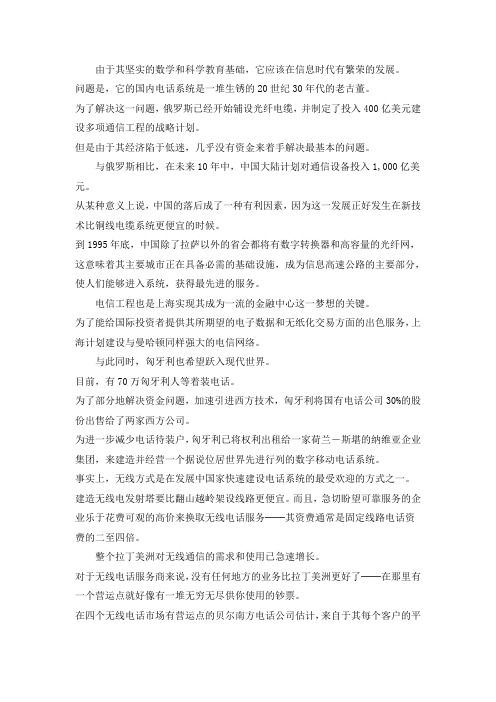
由于其坚实的数学和科学教育基础,它应该在信息时代有繁荣的发展。
问题是,它的国内电话系统是一堆生锈的20世纪30年代的老古董。
为了解决这一问题,俄罗斯已经开始铺设光纤电缆,并制定了投入400亿美元建设多项通信工程的战略计划。
但是由于其经济陷于低迷,几乎没有资金来着手解决最基本的问题。
与俄罗斯相比,在未来10年中,中国大陆计划对通信设备投入1,000亿美元。
从某种意义上说,中国的落后成了一种有利因素,因为这一发展正好发生在新技术比铜线电缆系统更便宜的时候。
到1995年底,中国除了拉萨以外的省会都将有数字转换器和高容量的光纤网,这意味着其主要城市正在具备必需的基础设施,成为信息高速公路的主要部分,使人们能够进入系统,获得最先进的服务。
电信工程也是上海实现其成为一流的金融中心这一梦想的关键。
为了能给国际投资者提供其所期望的电子数据和无纸化交易方面的出色服务,上海计划建设与曼哈顿同样强大的电信网络。
与此同时,匈牙利也希望跃入现代世界。
目前,有70万匈牙利人等着装电话。
为了部分地解决资金问题,加速引进西方技术,匈牙利将国有电话公司30%的股份出售给了两家西方公司。
为进一步减少电话待装户,匈牙利已将权利出租给一家荷兰-斯堪的纳维亚企业集团,来建造并经营一个据说位居世界先进行列的数字移动电话系统。
事实上,无线方式是在发展中国家快速建设电话系统的最受欢迎的方式之一。
建造无线电发射塔要比翻山越岭架设线路更便宜。
而且,急切盼望可靠服务的企业乐于花费可观的高价来换取无线电话服务──其资费通常是固定线路电话资费的二至四倍。
整个拉丁美洲对无线通信的需求和使用已急速增长。
对于无线电话服务商来说,没有任何地方的业务比拉丁美洲更好了──在那里有一个营运点就好像有一堆无穷无尽供你使用的钞票。
在四个无线电话市场有营运点的贝尔南方电话公司估计,来自于其每个客户的平均年收入均为2,000美元,而在美国仅为860美元。
产生这种情况的部分原因是拉丁美洲客户的通话时间是北美洲客户的二至四倍。
新视野大学英语读写教程第四册课文翻译(1~10单元)
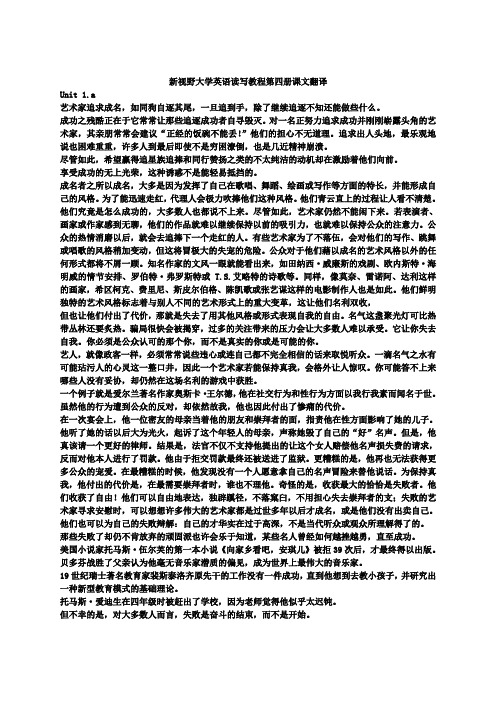
新视野大学英语读写教程第四册课文翻译Unit 1.a艺术家追求成名,如同狗自逐其尾,一旦追到手,除了继续追逐不知还能做些什么。
成功之残酷正在于它常常让那些追逐成功者自寻毁灭。
对一名正努力追求成功并刚刚崭露头角的艺术家,其亲朋常常会建议“正经的饭碗不能丢!”他们的担心不无道理。
追求出人头地,最乐观地说也困难重重,许多人到最后即使不是穷困潦倒,也是几近精神崩溃。
尽管如此,希望赢得追星族追捧和同行赞扬之类的不太纯洁的动机却在激励着他们向前。
享受成功的无上光荣,这种诱惑不是能轻易抵挡的。
成名者之所以成名,大多是因为发挥了自己在歌唱、舞蹈、绘画或写作等方面的特长,并能形成自己的风格。
为了能迅速走红,代理人会极力吹捧他们这种风格。
他们青云直上的过程让人看不清楚。
他们究竟是怎么成功的,大多数人也都说不上来。
尽管如此,艺术家仍然不能闲下来。
若表演者、画家或作家感到无聊,他们的作品就难以继续保持以前的吸引力,也就难以保持公众的注意力。
公众的热情消磨以后,就会去追捧下一个走红的人。
有些艺术家为了不落伍,会对他们的写作、跳舞或唱歌的风格稍加变动,但这将冒极大的失宠的危险。
公众对于他们藉以成名的艺术风格以外的任何形式都将不屑一顾。
知名作家的文风一眼就能看出来,如田纳西·威廉斯的戏剧、欧内斯特·海明威的情节安排、罗伯特·弗罗斯特或 T.S.艾略特的诗歌等。
同样,像莫奈、雷诺阿、达利这样的画家,希区柯克、费里尼、斯皮尔伯格、陈凯歌或张艺谋这样的电影制作人也是如此。
他们鲜明独特的艺术风格标志着与别人不同的艺术形式上的重大变革,这让他们名利双收,但也让他们付出了代价,那就是失去了用其他风格或形式表现自我的自由。
名气这盏聚光灯可比热带丛林还要炙热。
骗局很快会被揭穿,过多的关注带来的压力会让大多数人难以承受。
它让你失去自我。
你必须是公众认可的那个你,而不是真实的你或是可能的你。
艺人,就像政客一样,必须常常说些违心或连自己都不完全相信的话来取悦听众。
新视野大学英语第4册汉译英unit1-10
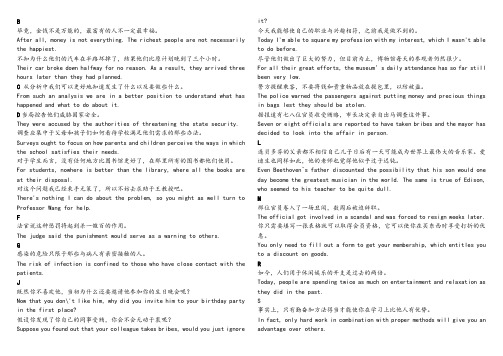
B毕竟,金钱不是万能的,最富有的人不一定最幸福。
After all, money is not everything. The richest people are not necessarily the happiest.不知为什么他们的汽车在半路坏掉了,结果他们比原计划晚到了三个小时。
Their car broke down halfway for no reason. As a result, they arrived three hours later than they had planned.C 从分析中我们可以更好地知道发生了什么以及要做些什么。
From such an analysis we are in a better position to understand what has happened and what to do about it.D当局控告他们威胁国家安全。
They were accused by the authorities of threatening the state security.调查应集中于父母和孩子们如何看待学校满足他们需求的那些办法。
Surveys ought to focus on how parents and children perceive the ways in which the school satisfies their needs.对于学生而言,没有任何地方比图书馆更好了,在那里所有的图书都他们使用。
For students, nowhere is better than the library, where all the books are at their disposal.对这个问题我已经束手无策了,所以不妨去求助于王教授吧。
There's nothing I can do about the problem, so you might as well turn to Professor Wang for help.F法官说这种惩罚将起到杀一儆百的作用。
新版新视野大学英语读写教程(第二版)第四册课后答案(pdf电子版)

新版新视野大学英语读写教程第四册unit1答案Unit1III.1.idle2.justify3.discount4.distinct5.minute6.accused7.object8.contaminate9.sustain10.worshipIV.1.accusing...of2.end up3.came upon4.at her worst5.pay for6.run a risk of7.participate in8.other than9.object to/objected10.at best V1.K2.G3.C4.E5.N6.O7.I8.L9.A10.DCollocationVI.1.delay2.pain3.hardship4.suffering5.fever6.defeat7.poverty8.treatment9.noise10.agonyWord buildingVII.1.justify2.glorify3.exemplifies4.classified5.purified6.intensify7.identify8.terrifiedVIII.1.bravery2.jewelry3.delivery4.machinery5.robbery6.nursery7.scenery8.discoverySentence StructureIX.1.other than for funerals and weddings2.other than to live an independent life3.other than that they appealed to his eye..`4.but other than that,he'll eat just about everything.5.other than that it's somewhere in the town centerX.1.shouldn't have been to the cinema last night2.would have;told him the answer3.they needn't have gone at all4.must have had too much work to do5.might have been injured seriouslyTranslationXI.-1.The plant does not grow well in soils other than the one in which it has been developed.2.Research findings show that we spend about two hours dreaming every night,no matter what wemay have done during the day.3.Some people tend to justify their failure by blaming others for not trying their best.4.We remain tree to our commitment:Whatever we promised to do;we would do it.5.Even Beethoven's father discounted the possibility that his son would one day become the greatest musician in the world.The same is true of Edison,who seemed to his teacher to be quite dull.6.They were accused by authorities of threatening the state security.XII.l.出入除自己家以外的任何场所时,如果你带有宠物,一定要了解有关宠物的规定。
新视野大学英语读写教程第4册答案__第二版答案10个单元全

第二版新视野大学英语读写教程4第四册课后答案Unit OneIII.1. idle2. justify3. discount4. distinct5. minute6.accused7. object8. contaminate9. sustain 10. worshipIV.1. accusing... of2. end up3. came upon4. at her worst5. pay for6. run a risk of7. participate in8. other than9. object to/objected 10. at bestV1. K2. G3. C4. E5. N6.O7.I8. L9. A 10. DCollocationVI.1. delay2. pain3. hardship4. suffering5. fever6. defeat7. poverty8. treatment9. noise 10. agonyWord buildingVII.1. justify2. glorify3. exemplifies4. classified5. purified6. intensify7. identify8. terrifiedVIII.1. bravery2. jewelry3. delivery4. machinery5. robbery6. nursery7. scenery8. discoverySentence StructureIX.1. other than for funerals and weddings2. other than to live an independent life3. other than that they appealed to his eye . . `4. but other than that, he'll eat just about everything .5. other than that it's somewhere in the town centerX.1. shouldn't have been to the cinema last night2. would have; told him the answer3. they needn't have gone at all4. must have had too much work to do5. might have been injured seriouslyTranslationXI. -1. The plant does not grow well in soils other than the one in which it has been developed.2. Research findings show that we spend about two hours dreaming every night, no matter what wemay have done during the day.3.Some people tend to justify their failure by blaming others for not trying their best.4.We remain tree to our commitment: Whatever we promised to do; we would do it.5.Even Beethoven's father discounted the possibility that his son would one day become the greatest musician in the world. The same is true of Edison, who seemed to his teacher to be quite dull.6. They were accused by authorities of threatening the state security.XII.l.出入除自己家以外的任何场所时,如果你带有宠物,一定要了解有关宠物的规定。
新视野大学英语第4册汉译英unit1-10
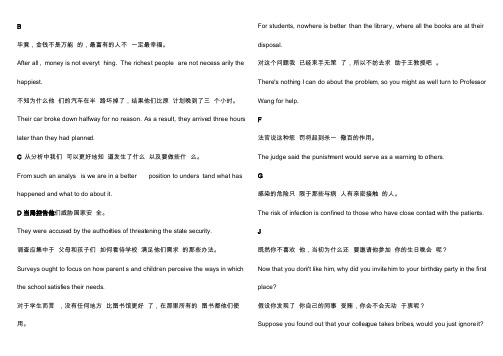
B毕竟,金钱不是万能的,最富有的人不一定最幸福。
After all, money is not everyth ing. The richest peopleare not necessa rily the happies t.不知为什么他们的汽车在半路坏掉了,结果他们比原计划晚到了三个小时。
Their car broke down halfway for no reason. As a result, they arrived three hours later than they had planned.C 从分析中我们可以更好地知道发生了什么以及要做些什么。
From such an analysi s we are in a betterpositio n to underst and what has happene d and what to do about it.D当局控告他们威胁国家安全。
They were accused by the authori ties of threate ning the state securit y.调查应集中于父母和孩子们如何看待学校满足他们需求的那些办法。
Surveys ought to focus on how parents and childre n perceiv e the ways in which the schoolsatisfi es their needs.对于学生而言,没有任何地方比图书馆更好了,在那里所有的图书都他们使用。
For student s, nowhere is betterthan the library, where all the books are at their disposa l.对这个问题我已经束手无策了,所以不妨去求助于王教授吧。
新视野大学英语第四册课后题答案详解
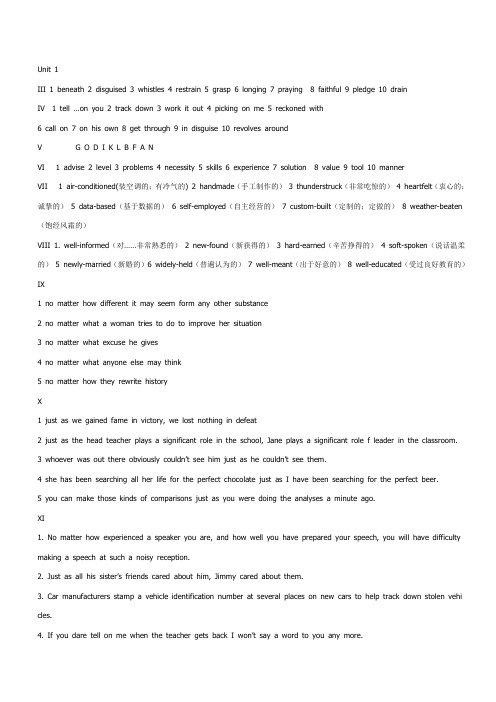
Unit 1III 1 beneath 2 disguised 3 whistles 4 restrain 5 grasp 6 longing 7 praying 8 faithful 9 pledge 10 drainIV 1 tell …on you 2 track down 3 work it out 4 picking on me 5 reckoned with6 call on7 on his own8 get through9 in disguise 10 revolves aroundV G O D I K L B F A NVI 1 advise 2 level 3 problems 4 necessity 5 skills 6 experience 7 solution 8 value 9 tool 10 mannerVII 1 air-conditioned(装空调的;有冷气的) 2 handmade(手工制作的)3 thunderstruck(非常吃惊的)4 heartfelt(衷心的;诚挚的)5 data-based(基于数据的)6 self-employed(自主经营的)7 custom-built(定制的;定做的)8 weather-beaten (饱经风霜的)VIII 1. well-informed(对……非常熟悉的)2 new-found(新获得的)3 hard-earned(辛苦挣得的)4 soft-spoken(说话温柔的)5 newly-married(新婚的)6 widely-held(普遍认为的)7 well-meant(出于好意的)8 well-educated(受过良好教育的)IX1 no matter how different it may seem form any other substance2 no matter what a woman tries to do to improve her situation3 no matter what excuse he gives4 no matter what anyone else may think5 no matter how they rewrite historyX1 just as we gained fame in victory, we lost nothing in defeat2 just as the head teacher plays a significant role in the school, Jane plays a significant role f leader in the classroom.3 whoever was out there obviously couldn’t see him just as he couldn’t see them.4 she has been searching all her life for the perfect chocolate just as I have been searching for the perfect beer.5 you can make those kinds of comparisons just as you were doing the analyses a minute ago.XI1. No matter how experienced a speaker you are, and how well you have prepared your speech, you will have difficulty making a speech at such a noisy reception.2. Just as all his sister’s friends cared about him, Jimmy cared about them.3. Car manufacturers stamp a vehicle identification number at several places on new cars to help track down stolen vehi cles.4. If you dare tell on me when the teacher gets back I won’t say a word to you any more.5. Some elderly people prefer to live on their own while the great majority choose to live with their children.6. Here is something that needs to be reckoned with: how to get the necessary finances to establish the company.XII1. 每当有人帮了你,无论事情大小,无论他地位高低,你都应该对他说声“谢谢”。
新视野大学英语读写教程第二版4课后答案版
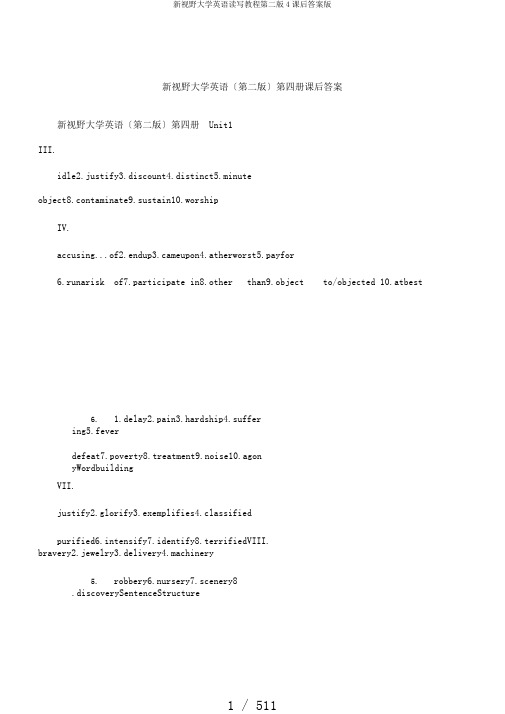
新视野大学英语〔第二版〕第四册课后答案新视野大学英语〔第二版〕第四册Unit1III.idle2.justify3.discount4.distinct5.minuteobject8.contaminate9.sustain10.worshipIV.accusing...of2.endup3.cameupon4.atherworst5.payfor6.runarisk of7.participate in8.other than9.object to/objected 10.atbest6. 1.delay2.pain3.hardship4.suffering5.feverdefeat7.poverty8.treatment9.noise10.agonyWordbuildingVII.justify2.glorify3.exemplifies4.classifiedpurified6.intensify7.identify8.terrifiedVIII.bravery2.jewelry3.delivery4.machinery5.robbery6.nursery7.scenery8.discoverySentenceStructureIX.otherthanforfuneralsandweddingsotherthantoliveanindependentlifeotherthanthattheyappealedtohiseye..`butotherthanthat,he'lleatjustabouteverything.otherthanthatit'ssomewhereinthetowncenterX.shouldn'thavebeentothecinemalastnightwouldhave;toldhimtheanswertheyneedn'thavegoneatallmusthavehadtoomuchworktodomighthavebeeninjuredseriouslyTranslationXI.-Theplantdoesnotgrowwellinsoilsotherthantheoneinwhichithasbeendeveloped. Researchfindingsshowthatwespendabouttwohoursdreamingeverynight,nomatterwhatwemayhavedoneduringtheday..Somepeopletendtojustifytheirfailurebyblamingothersfornottryingtheirbest..Weremaintruetoourcommitment:Whateverwepromisedtodo;wewoulddoit..EvenBeethoven'sfatherdiscountedthepossibilitythathissonwouldonedaybecomethegreatestmusicianintheworld.ThesameistrueofEdison,whoseem edtohisteachertobequitedull.Theywereaccusedbytheauthoritiesofthreateningthestatesecurity.XII.出入除自己家以外的任何场所时,如果你带有宠物,一定要了解有关宠物的规定。
第二版新视野大学英语读写教程4第四册课后答案
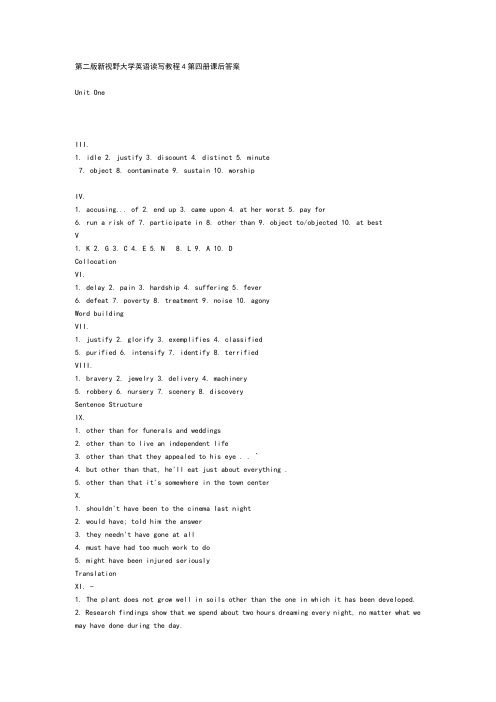
第二版新视野大学英语读写教程4第四册课后答案Unit OneIII.1. idle2. justify3. discount4. distinct5. minute7. object 8. contaminate 9. sustain 10. worshipIV.1. accusing... of2. end up3. came upon4. at her worst5. pay for6. run a risk of7. participate in8. other than9. object to/objected 10. at bestV1. K2. G3. C4. E5. N 8. L 9. A 10. DCollocationVI.1. delay2. pain3. hardship4. suffering5. fever6. defeat7. poverty8. treatment9. noise 10. agonyWord buildingVII.1. justify2. glorify3. exemplifies4. classified5. purified6. intensify7. identify8. terrifiedVIII.1. bravery2. jewelry3. delivery4. machinery5. robbery6. nursery7. scenery8. discoverySentence StructureIX.1. other than for funerals and weddings2. other than to live an independent life3. other than that they appealed to his eye . . `4. but other than that, he'll eat just about everything .5. other than that it's somewhere in the town centerX.1. shouldn't have been to the cinema last night2. would have; told him the answer3. they needn't have gone at all4. must have had too much work to do5. might have been injured seriouslyTranslationXI. -1. The plant does not grow well in soils other than the one in which it has been developed.2. Research findings show that we spend about two hours dreaming every night, no matter what we may have done during the day.people tend to justify their failure by blaming others for not trying their best.remain tree to our commitment: Whatever we promised to do; we would do it.Beethoven's father discounted the possibility that his son would one day become the greatest musician in the world. The same is true of Edison, who seemed to his teacher to be quite dull.6. They were accused by authorities of threatening the state security.XII.l.出入除自己家以外的任何场所时,如果你带有宠物,一定要了解有关宠物的规定。
新视野第四册unit10翻译

1. Translate the following sentences into English.1. 无论你的智商有多高,你的看法都受到个人经历的局限,因此要学会吸纳他人有用的观点。
(no matter...)Key for reference: No matter how high your IQ is, your view is limited by the experience you have had and so you should learn to incorporate the useful perspectives of others.2. 这个游戏非常有趣,他们谁也没有注意到时间的流逝。
(Use inverted order of "so... that..."; take note of)Key for reference: So interesting was the game that none of them took note of the passage of time.3. 我一直在整理这些旧文件,看看哪些有用,哪些需要扔掉。
(sort through)Key for reference: I've been sorting through these old documents to see which are useful and which can be thrown away.4. 随着年龄越来越大,你应该考虑未来的计划。
(reflect on)Key for reference: As you get older you should reflect on future plans.5. 他在演出中的亮相简直是个轰动。
(nothing less than)Key for reference: His appearance in the show was nothing less than a sensation.6. 他们每个月都从工资中留出一笔钱,用于孩子将来的教育。
新视野大学英语4课后练习答案(完美版)

新视野⼤学英语4课后练习答案(完美版)新视野⼤学英语读写教程Book 4 Unit1课后练习答案Section AIII.1. idle2. Justify3. discount4. distinct5. minute7. object 8. contaminate 9. sustain 10. worshipIV.1. accusing... of2. end up3. came upon4. at her worst5. pay for6. run a risk of7. participate in8. other than9. object to/objected 10. at bestV.1. K2. G3. C4. E5. N 8. L 9. A 10. DVI.1. delay2. pain3. hardship4. suffering5. fever6. defeat9. noise 10. agonyVII.1. justify2. glorify3. exemplifies4. classified5. purified6. intensify7. identify8. terrifiedVIII.1. bravery2. jewelry3. delivery4. machinery5. robbery6. nursery7. scenery8. discoveryIX.1. other than for funerals and weddings2. other than to live an independent life3. other than that they appealed to his eye4. but other than that, he'll eat just about everything .5. other than that it's somewhere in the town centerX.1. shouldn't have been to the cinema last night2. would have; told him the answer3. they needn't have gone at all4. must have had too much work to do5. might have been injured seriouslyXI.1. The plant does not grow well in soils other than the one in which it h as been developed.2. Research findings show that we spend about two hours dreaming every night, no matter what we may have done during4. We remain tree to our commitment: Whatever we promised to do; we would do it.5. Even Beethoven's father discounted the possibility that his son would one day become the greatest musician in the world. The same is true of Edi son, who seemed to his teacher to be quite dull.6. They were accused by authorities of threatening the state security. XII.l. 出⼊除⾃⼰家以外的任何场所时,如果你带有宠物,⼀定要了解有关宠物的规定。
新视野大学英语视听说教程第四册答案Unit10

Uint10II. Basic Listening Practice1.ScriptW: Many Chinese students are too shy to say anything in a classroom.M: I think they don’t speak because their culture values modesty, and they don’t want to appear to be showing off. Goes back to Confucius.Q: Wh y don’t Chinese students say anything in classroom according to the man? 2.ScriptW:The government is doing something at last about sex discrimination in the workplace. Women deserve the same pay as men for the same work.M: Yeah. In the United States, women earn only 70 percent of what men do for the same job. It’s a situation that has to be changed.Q: What does the man say about women?3. ScriptW: I admire Michael Dell. He had a dream to be the world’s largest manufacturer of personal computers, and he has realized that dream.M:And he dropped out of university to become a success. I wonder if there is a lesson in that.Q: What do we learn about Dell from the conversation?4. ScriptM: Successful entrepreneurs are often self-made people who have a vision and know where they are going.W: But do they enjoy life like you and me, or is money their only concern?Q: What are the two speakers’ attitudes toward successful entrepreneurs?5. ScriptW: Do you agree that equal opportunity for all in an educational system is important? M: Yes, but we have to recognize that all of us are not of equal ability.Q: What does the man imply?Keys: 1.C 2.A 3. D 4.B 5.AIII. Listening InTask 1: Competition in AmericaScriptAlan: What are you reading, Eliza?Eliza: An article on American competition.Alan:Competition is everywhere and constant. Why so much fuss about it, Miss Knowledge?Eliza:Don’t make fun of me. According to the author, competition is especially important in American life. They’re taught to comp ete from early childhood.When children play games, they learn how to beat others.Alan: And many girls want to look more attractive than the girls sitting next to them in class. Do you think that way?Eliza:Don’t be silly. Let’s get back to the point. Wh en children are growing up, they compete with one another in their studies.Alan: Isn’t that also true of students in other nations? As we all know, many Asian students kill for a high test score and grab every opportunity to sharpen their competitive edge over others.Eliza:American boys find great pleasure in competing with each other in sports, according to the author.Alan:I do like sports. When our football team beats the other team, I feel great.Makes me want to shout out loud. But isn’t that norma l throughout the world? Eliza:American people also compete with each other at work and at climbing the social ladder.Alan: But there’s competition in other countries as well.Eliza: You’re right in a sense, but the author says the idea of competing is mo re deeply rooted in the minds of Americans. They’re even taught that if you lose and don’t feel hurt, there must be something wrong with you.Alan: I hear that some Asians put emphasis on cooperation. Which approach do you think makes more sense?Eliza: It’s hard to say. Anyway, there’s no accounting for different cultures.1.What is the dialog mainly about?2.What is the woman doing?3.What do children learn from playing games according to the woman?4.What does the man say about students’ studies?5.What does the woman say when asked which makes more sense, competition orcooperation?Keys: 1.C 2.A 3.C 4.B 5.DTask 2: Americans’ Work EthicScriptFor four hundred years or more, one thing has been a characteristic of Americans. It is called their “work ethic”. Its (S1) roots were in the teaching of the Christian Puritans who first settled in (S2) what is now the northeastern state of Massachusetts. They believed that it was their (S3) moral duty to work at every task to please God by their(S4) diligence, honesty, attention to details, skill, and attitude. To these Puritans, it was a (S5) sin to be lazy or to do less than your best in any task. They and later Americans tried to follow the Bible’s (S6) teachings, “If a man will not work, he shall not eat.”Therefore, Americans have for (S7) centuries believed that they were guilty of sin if they did not work as carefully and hard as they could when they did anything. God would punish those who were careless or lazy in their work. (S8) Even as children they were taught, “If it’s worth doing at all, it’s worth doing well.”But some people have gone beyond the usual sense of diligence. They are especially attracted to the notion of “climbing the ladder” so as to increase their status, financial position, and sense of self-worth. (S9) In English a new word has been created to describe people who work compulsivelly. The word “workaholic” describes an individual who is as addicted to work as an alcoholic is to alcohol.There are conflicting points of view about workaholics. Those concerned with problems of mental stress believe workaholics abuse themselves physically and mentally. (S10) Others hold that workaholics are valuable members of society because they are extremely productive. The American culture values achievement, efficiency, and production, and a workaholic upholds these values.Task 3: Do you know what “Freeze!” means?ScriptThere is one word which you must learn before you visit the U.S.A. That is “Freeze!” It means, “Stand still and don’t move.” Police of ficers use it when they are ready to use their guns. If the person does not obey the command and moves, they shoot.One evening in Los Angeles, someone rang the bell doorbell of a house. It was a dangerous area at night, so the owner of the house took his gun with him when he answered the door. He opened the door and saw a person, who turned round and started walking away from the house. The owner cried “Freeze!”, but the man went on walking. The owner thought he tried to escape, so he shot him dead.Later, a sad story was uncovered. The dead man was Yoshiro Hattori, a 16-year-old Japanese exchange student. He went to visit a friend for a Halloween party, but he could not remember the number of the house. When he realized that he had gone to the wrong house, he turned round to leave. He did not know much English and so did not understand the command “Freeze!”.The tragedy arose from cultural misunderstanding. Those who have lived in the United States for a long time understand the possibility of being shot when one trespasses upon an individual’s property. It is a well-known fact in America that a person’s home is his castle. Although Rodney Pears, the owner of the house, gave a verbal warning “Freeze!” to Hattori, Hattori did not know it meant “Stand still an d don’t move”, and therefore did not obey it. This misunderstanding became the trigger of Hattori’s disaster. The concept of owning guns is hard for Japanese people to understand, but in America you are permitted to own a gun under the U.S. Constitution.1.Wh at does the word “Freeze!” mean in the passage?2.What did the owner of the house take with him when he answered the door?3. Why did the Japanese student turn around and leave?4.What is mentioned as a possible result of trespassing?5.Wh y is the phrase “a person’s home is his castle” quoted in the passage?Keys: 1.C 2.A 3.D 4.B 5.CIV. Speaking OutMODEL 1Americans glorify individualism.Susan: John, I was looking for you. Where have you been hiding all morning? John: Well, I caught Profess or Brown’s lecture on American individualism. Susan:Oh, how did you find it?John:Enlightening. Americans glorify individualism. They believe individual interests rank above everything else.Susan:Sounds intersting. It’s a sharp contrast to the orie ntal collectivism Professor Wang talked about last semester.John:But you should know that the individualism in the United States is not necesssarily an equivalent for selfishness.Susan: Then what does it mean in the States?John: They believe all values, rights, and duties originate in individuals, so they emphasize individual initiative and independence.Susan:There could be something in that. Of course in oriental countries the interests of the group are more important than anything else.John: I So, it’s all the more necessary for foreigners to understand American culture, or they can’t hope to understand the importance of privacy in the West.. Susan:Maybe that’s the reason nuclear families outnumber extended families in the United States.John: Right on! You’re catching on fast!Susan: Now let me ask you a question.John: Shoot. Go ahead.Susan: Why do Americans cherish individualism more than oriental people? John: I don’t know. Anyway, Professor Brown didn’t say.Susan: One reason might be that American children stop sleeping with their parents at an early age. They learn independence early, so it’s deeply rooted. John: Wow, that’s an intelligent guess!MODEL2What do you think are the reasons forthat difference?ScriptSusan: Do you find that people in America often walk faster than people in China?Americans always seem to be in a hurry.John: It’s hard to come to a definite conclusion. Some Americans walk in a leisurely way, and some Chinese hurry all the time. But on the whole, Ithink you’re right.Susan:What do you think are the reasons for that difference?John:Americans treasure time. For them, time is tangible. It’s a thing. “Time is money.” You can “spend time”, “waste time”, “save time”. You can even“kill time”!Susan:Does this strong sense of time affect their lifestyle?John:Sure. If you’re 20 minutes late for a bussiness appointment, the other person or persons will be annoyed. They may not trust you anymore.Susan: But as far as I know, English-speaking people may be 15-30 minutes late fora dinner party.John: That’s true. For an informal occasion like that, punctuality is not so important. Also, a boss may keep his employees waiting for a long time. Susan:But if his secretary is late, she’s in trouble. She will probably receive a reprimand.John: How true!Susan:The American workship of time probably led them to create fast foods. John: I agree. And globalization shrinks the differences between cultures. Now people everywhere are rushing, and anywhere you go, you find KentuckyFried Chicken.Susan: But plenty of Chinese are still making appointments saying, “If I am late, wait for me.”John: But with more intercultural communication, I think the gap will eventually be bridged, and Chinese will be hurrying everywhere.MODEL3That’s the secret of their success.ScriptChris: Hey Sue, how’s the math class going? Are you head of the class?Susan:Are you kidding? There’s a bunch of foreign students in the class---from China somewhere---and they are on top.Chris: Why do you think so many Chinese students excel in math? It’s been my observation that the Chinese students are usually the best.Susan:In class they don’t say much, but they definitely get the best marks. Chris: I think part of it is their work ethic. They never skip class, and they pay attention.Susan:One Chinese student in my class did homework each night until the early hours. He never took a break, watched TV, or went out for a beer.Chris:That’s the secret of their success: hard work and deligence.Susan:It’s so unfair. I could probably do better if I worked harder, but that’s no fun.I think learning should be more fun.Chris:Someone with a knowledge of chess would find a chess tournament fascinating. But if you don’t have the knowledge, then you won’t understand the significance of themoves, and you’ll be bored.Susan:So what you’re saying is knowledge requires hard work, and knowledge makes things interesting. I am not against knowledge; I just want to learn it in an interesting way.What’s more, “All work and noplay makes Jack a dull boy.”Now Your TurnTask 1:SAMPLE DIALOGMaggie: Josh, you were late for work this morning.Josh: I was only about ten minutes late. Anyway, the boss didn’t say any thing about it.Maggie:As a friend, I must give you a warning. You should understand that Americans treasure time.Josh: What do you mean?Maggie: You see, for them time is tangible. It’s a thing. “Time is money.” You can “spend time”, “waste time”, “save time”. You can even “kill time”!Josh: Does this strong sense of time affect their lifestyle?Maggie: If you’re 20 minutes late for a business appointment, the other persons will be annoyed. They may not trust you anymore. Today you were ten minuteslate for work. That was bad enough.Josh: I was caught in a traffic jam. What could I have done?Maggie: You should have called the secretary to say you might be late. I learned the importance of punctuality when I studied at an American university. Josh: Tell me about it.Maggie: Some students were late handing in assignments and the professors gave them poor marks. One professor even refused to read a term paper that wasturned in after the deadline.Josh: But as far as I know, English-speaking people may be 15-30 minutes late fora dinner party.Maggie:That’s true. For an informal occasion like that, punctuality is not so important. Also, a boss may keep his employees waiting for a long time. Josh: But if his secretary is late, she’s in trouble. S he will probably be reprimanded.Maggie: How true!V. Let’s TalkScriptCulture shock happens to most people who travel abroad. Psychologists tell us that there are five distinct phases of culture shock.During the first few days of a person’s stay in a n ew country, everything usually goes fairly smoothly. The newcomer is excited about being in a new place where there are new sights and sounds, new smells and tastes. They may find themselves staying in hotels or with a home-stay family that is excited to meet the foreign stranger. This first stage of culture shock is called the “honeymoon phase”.Unfortunately, this phase often comes to an end fairly soon. The newcomer may encounter many problems in transportation, shopping, or interpersonal communication. You may feel that people no longer care about your problems. You might even start to think that the people in the host country don’t like foreigners. This may lead to the second stage of culture shock, known as the “rejection phase”. The newcomer may start to complain about and reject the host culture.If you don’t survive stage two successfully, you may find yourself moving into stage three: the “regression phase”. The word “regression” means moving backward, and in this phase of culture shock, you spend much of your time speaking your own language, watching videos from your home country, and eating food form home. Also, you may remember only the good things about your home country.If you survive the third stage successfully, you will move into the fourth stage of culture shock called the “recovery phase”. In this stage you become more comfortable with the customs of the host country. You start to realize that no country is that much better than another---they are just different.Much later, when you return to your homeland, you may find yourself entering the fifth phase of culture shock---the “reverse culture shock”. After you have become comfortable with the habits and customs of a new lifestyle, you may find that you are no longer completely comfortable in your home country. It may take a little while to become at ease with your home culture.If you overcome the problems in all five phases, you will be much stronger, and youVI.Further Listening and SpeakingTask 1: PunctualityScriptT o Americans, punctuality is a way of showing respect for other people’s time. Being more than 10 minutes late to an appointment usually calls for an apology, and maybe an explanation. People who are running late often call ahead to let others know of the delay. Of course, the less formal the situation, the less important it is to be exactly on tome. At informal get-togethers, for example, people often arrive as much as 30 minutes past the appointed time. But they usually don’t try that at work.American lifestyles show how much people respect the time of others. When people plan an event, they often set the time days or weeks in advance. Once the time is fixed, it takes almost an emergency to chance it. If people want to come to your house for a friendly visit, they will usually call first to make sure it is convenient. Only very close friends will just “drop in” unannounced. Also, p eople hesitate to call others late at night for fear they might be in bed. The time may vary, but most folks think twice about calling after 10:00 p.m.To outsiders, Americans seem tied to the clock. People in some Eastern cultures value relationships more than schedules. In these societies, people don’t try to control time, but to experience it. Many Eastern cultures, for example, view time as a cycle. The rhythm of nature---from the passing of seasons to the monthly cycle of the moon---shapes their view of events. If they have wasted some time or let an opportunity pass by, they are not very worried, knowing that more time and opportunities will come in the next cycle. But Americans often want to jump at the first opportunity. They are unwilling to stand by idly and give up the opportunity.The early American hero Benjamin Franklin expressed that view of time like this: “Do you love life? Then do now waste time, for that is the stuff life is made of.”1.According to the passage, when people are late in America, what do they do?2.According to the passage, what do Americans do after the time for an appointmentis fixed?3.How do people in some Eastern countries view relationships and schedules?4.According to the passage, why aren’t some Eastern people worried if they let anopportunity pass by?5. What was Benjamin Franklin’s view of time?Keys: 1.C 2.B 3.A 4.C 5.DTask 2: Our Personal SpacesScriptOur personal space, that piece of the universe we occupy and call our own, is contained within an invisible boundary surrounding our body. As the owners of this area, we usually decide who may enter and who may not. When our space is invaded, we react in a variety of ways. We back up and retreat, stand our ground as our hands become moist from nervousness, or sometimes even react violently. Our response shows not only our unique personality, but also our cultural background.For example, cultures that stress individualism such as England, the United States, Germany, and Australia generally demand more space than collective cultures do, and tend to become aggressive when their space is invaded. This idea of space is quite different from the one found in the Mexican and Arab cultures. In Mexico, the physical distance between people when engaged in conversation is closer than what is usual north of the border. And for middle easterner, typical Arab conversations are at close range. Closeness cannot be avoided.As is the case with most of our behavior, our use of space is directly linked to the value system of our culture. In some Asian cultures, for example, employees do not stand near their bosses; the extended distance demonstrates respect. Extra interpersonal distance is also part of the cultural experience of the people of Scotland and Sweden, for whom it reflects privacy. And in Germany, private space is sacred. Keys: 1.T 2.F 3.T 4.F 5.FTask 3: We don’t know what to do with them.ScriptA Russian, a Cuban, an American businessman, and an American lawyer were passengers on a fast train speeding across the French countryside. As time wore on, the men gradually became friendly with one another, introducing themselves and shaking hands. Eventually, the Russian took out a large bottle of vodka and poured each of his traveling companions a drink. Just as the American businessman was sipping the vodka and praising its fine quality, the Russian hurled the half-full bottleout of the open window.“What did you do that for?” asked the startled American businessman.“V odka is plentiful in my country,” said the Russian, “In fact, we have thousands and thousands of liters of it---far more than we need.”The American businessman shook his head and leaned back in his seat, obviously baffled by the Russian’s reasoning.A little later, the young Cuban passed around a box of fine Havana cigars. The men enjoyed this treat and made admiring remarks about the pleasures of smoking good Havana cigars. At that very moment the Cuban took a couple of puffs of his cigar and then tossed it out of the open window.“I thought the Cuban economy was not good this year,” the American businessman said. “Yet you threw that perfectly good cigar away. I find your actions quite puzzling.”“Cigars,” the Cuban replied, “are a dime a dozen in Cuba. We have more of them than we know what to do with.”The American businessman sat in silence for a moment. Then he got up, grbbed the lawyer, and threw him out of the window.News ReportRussian Popcorn FestivalScriptAmerican popcorn has made its way into the heart of Russian culture. Organizers and participants came together on Sunday at a Moscow festival marking the tenth anniversary of the introduction of popcorn to Russia.It was exactly ten years ago, on December 16, 1991, that popcorn, considered an American delicacy here, first made its appearance in this land famous for its artists.To celebrate the occasion, ten “artists” decided to recreate a famous Russian painting in, you guessed it, popcorn. It took the ten artists a total of six hours of painstaking work to complete the popcorn painting. The result of this long ordeal was a 120 square meter popcorn mosaic.The Russian Records Agency, the local equivalent of the Guinness Book of World Records, was at the Manezh exhibition complex to witness the event. A ceremony was held in front of onlookers to officially register the record.[SOUND BITE]The ceremony was immediately followed by a popcorn lovers’feast, with festival-goers consuming large amounts of the much-loved snack. Both the young and the old eagerly took part in the festive celebrations. Some participants voiced their support for the unusual event. [SOUND BITE]There were also those who talked about feeling a sense of camaraderie among their fellow popcorn enthusiasts.[SOUND BITE]The celebrations continued for hours and even included some live performances.Clean up for the event was no problem---there were many eager onlookers on hand to cleanup---and eat---the delicious mess.11。
新视野大学英语4 UNIT10课文翻译及答案
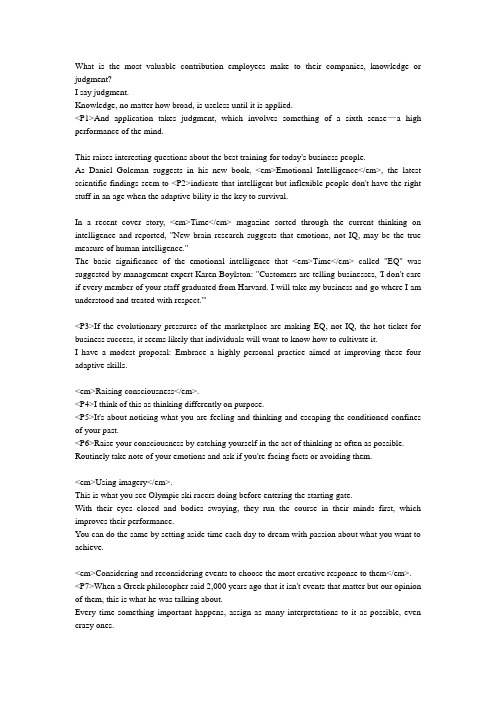
What is the most valuable contribution employees make to their companies, knowledge or judgment?I say judgment.Knowledge, no matter how broad, is useless until it is applied.<P1>And application takes judgment, which involves something of a sixth sense—a high performance of the mind.This raises interesting questions about the best training for today's business people.As Daniel Goleman suggests in his new book, <em>Emotional Intelligence</em>, the latest scientific findings seem to <P2>indicate that intelligent but inflexible people don't have the right stuff in an age when the adaptive bility is the key to survival.In a recent cover story, <em>Time</em> magazine sorted through the current thinking on intelligence and reported, "New brain research suggests that emotions, not IQ, may be the true measure of human intelligence."The basic significance of the emotional intelligence that <em>Time</em> called "EQ" was suggested by management expert Karen Boylston: "Customers are telling businesses, 'I don't care if every member of your staff graduated from Harvard. I will take my business and go where I am understood and treated with respect.'"<P3>If the evolutionary pressures of the marketplace are making EQ, not IQ, the hot ticket for business success, it seems likely that individuals will want to know how to cultivate it.I have a modest proposal: Embrace a highly personal practice aimed at improving these four adaptive skills.<em>Raising consciousness</em>.<P4>I think of this as thinking differently on purpose.<P5>It's about noticing what you are feeling and thinking and escaping the conditioned confines of your past.<P6>Raise your consciousness by catching yourself in the act of thinking as often as possible. Routinely take note of your emotions and ask if you're facing facts or avoiding them.<em>Using imagery</em>.This is what you see Olympic ski racers doing before entering the starting gate.With their eyes closed and bodies swaying, they run the course in their minds first, which improves their performance.You can do the same by setting aside time each day to dream with passion about what you want to achieve.<em>Considering and reconsidering events to choose the most creative response to them</em>. <P7>When a Greek philosopher said 2,000 years ago that it isn't events that matter but our opinion of them, this is what he was talking about.Every time something important happens, assign as many interpretations to it as possible, even crazy ones.Then go with the interpretation most supportive of your dreams.<em>Integrating the perspectives of others</em>.Brain research shows that our view of the world is limited by our genes and the experiences we've had.<P8>Learning to <1>incorporate</1> the useful perspectives of others is nothing less than a form of enlarging your senses.The next time someone interprets something differently from you—say, a controversial political event—pause to reflect on the role of life experience and consider it a gift of perception.<P9>The force of habit—literally the established wiring of your brain—will pull you away from practicing these skills.Keep at it, however, because they are based on what we're learning about the mechanism of the mind.Within the first six months of life the human brain doubles in capacity.It doubles again by age four and then grows rapidly until we reach sexual maturity.The body has about a hundred billion nerve cells, and every experience <2>triggers</2> a brain response that literally shapes our senses.The mind, we now know, is not confined to the brain but is distributed throughout the body's universe of cells.Yes, we do think with our hearts, brains, muscles, blood and bones.During a single crucial three-week period during our teenage years, chemical activity in the brain is cut in half.<P10>That done, we are "biologically wired" with what one of the nation's leading brain researchers calls our own "world view".He says it is impossible for any two people to see the world exactly alike.So unique is the personal experience that people would understand the world differently.However, it is not only possible to change your world view, he says, it's actually easier than overcoming a drug habit.<P11>But you need a discipline for doing it.Hence, the method recommended here.<P12>No, it's not a curriculum in the sense that an MBA is.But the latest research seems to imply that without the software of emotional maturity and self-knowledge, the hardware of academic training alone is worth less and less.员工对公司最有价值的贡献是什么,是知识还是判断力?我说是判断力。
新视野大学英语读写教程4第二版课后翻译
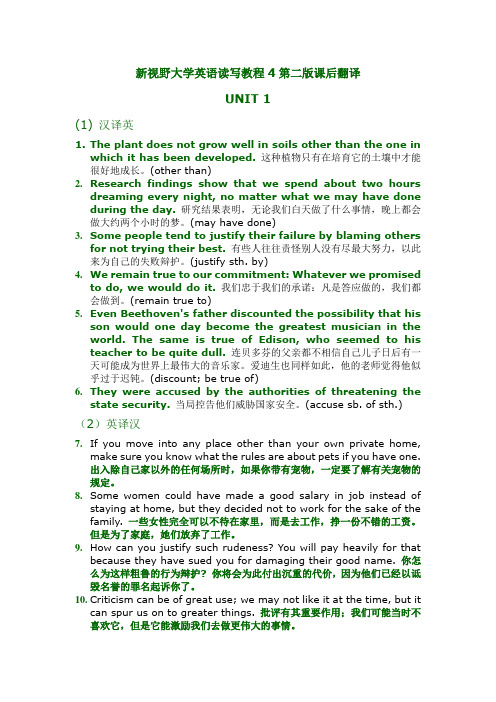
新视野大学英语读写教程4第二版课后翻译UNIT 1(1) 汉译英1.The plant does not grow well in soils other than the one inwhich it has been developed.这种植物只有在培育它的土壤中才能很好地成长。
(other than)2.Research findings show that we spend about two hoursdreaming every night, no matter what we may have done during the day.研究结果表明,无论我们白天做了什么事情,晚上都会做大约两个小时的梦。
(may have done)3.Some people tend to justify their failure by blaming othersfor not trying their best.有些人往往责怪别人没有尽最大努力,以此来为自己的失败辩护。
(justify sth. by)4.We remain true to our commitment: Whatever we promisedto do, we would do it.我们忠于我们的承诺:凡是答应做的,我们都会做到。
(remain true to)5.Even Beethoven's father discounted the possibility that hisson would one day become the greatest musician in the world. The same is true of Edison, who seemed to his teacher to be quite dull.连贝多芬的父亲都不相信自己儿子日后有一天可能成为世界上最伟大的音乐家。
爱迪生也同样如此,他的老师觉得他似乎过于迟钝。
新视野大学英语4 UNIT10课文翻译及谜底

What is the most valuable contribution employees make to their companies, knowledge or judgment? I say judgment. Knowledge, no matter how broad, is useless until it is applied. <P1>And application takes judgment, which involves something of a sixth sense—a high performance of the mind.
对全部高中资料试卷电气设备,在安装过程中以及安装结束后进行高中资料试卷调整试验;通电检查所有设备高中资料电试力卷保相护互装作置用调与试相技互术关,通系电1,力过根保管据护线0生高不产中仅工资22艺料22高试可中卷以资配解料置决试技吊卷术顶要是层求指配,机置对组不电在规气进范设行高备继中进电资行保料空护试载高卷与中问带资题负料22荷试,下卷而高总且中体可资配保料置障试时23卷,23调需各控要类试在管验最路;大习对限题设度到备内位进来。行确在调保管整机路使组敷其高设在中过正资程常料1工试中况卷,下安要与全加过,强度并看2工且55作尽22下可2都能护1可地关以缩于正小管常故路工障高作高中;中资对资料于料试继试卷电卷连保破接护坏管进范口行围处整,理核或高对者中定对资值某料,些试审异卷核常弯与高扁校中度对资固图料定纸试盒,卷位编工置写况.复进保杂行护设自层备动防与处腐装理跨置,接高尤地中其线资要弯料避曲试免半卷错径调误标试高方中等案资,,料要编5试求写、卷技重电保术要气护交设设装底备备4置。高调、动管中试电作线资高气,敷料中课并3设试资件且、技卷料中拒管术试试调绝路中验卷试动敷包方技作设含案术,技线以来术槽及避、系免管统不架启必等动要多方高项案中方;资式对料,整试为套卷解启突决动然高过停中程机语中。文高因电中此气资,课料电件试力中卷高管电中壁气资薄设料、备试接进卷口行保不调护严试装等工置问作调题并试,且技合进术理行,利过要用关求管运电线行力敷高保设中护技资装术料置。试做线卷到缆技准敷术确设指灵原导活则。。:对对在于于分调差线试动盒过保处程护,中装当高置不中高同资中电料资压试料回卷试路技卷交术调叉问试时题技,,术应作是采为指用调发金试电属人机隔员一板,变进需压行要器隔在组开事在处前发理掌生;握内同图部一纸故线资障槽料时内、,设需强备要电制进回造行路厂外须家部同出电时具源切高高断中中习资资题料料电试试源卷卷,试切线验除缆报从敷告而设与采完相用毕关高,技中要术资进资料行料试检,卷查并主和且要检了保测解护处现装理场置。设。备高中资料试卷布置情况与有关高中资料试卷电气系统接线等情况,然后根据规范与规程规定,制定设备调试高中资料试卷方案。
新视野大学英语第四册课文及译文整理!

正副课文的词汇写作的题目与5,6,10单元正副课文有关10空15个选项的与5,6,10的A篇有关词汇选择和翻译句子与正课文有关Unit 5Section A Choose to be alone on purposeHere we are, all by ourselves, all 22 million of us by recent count, alone in our rooms, some of us liking it that way and some of us not. Some of us divorced, some widowed, some never yet committed.Loneliness may be a sort of national disease here, and it's more embarrassing for us to admit than any other sin. On the other hand, to be alone on purpose, having rejected company rather than been cast out by it, is one characteristic of an American hero. The solitary hunter or explorer needs no one as they venture out among the deer and wolves to tame the great wild areas. Thoreau, alone in his cabin on the pond, his back deliberately turned to the town. Now, that's character for you. Inspiration in solitude is a major commodity for poets and philosophers. They're all for it. They all speak highly of themselves for seeking it out, at least for an hour or even two before they hurry home for tea.Consider Dorothy Wordsworth, for instance, helping her brother William put on his coat, finding his notebook and pencil for him, and waving as he sets forth into the early spring sunlight to look at flowers all by himself. “How graceful, how benign, is soli tude,” he wrote.No doubt about it, solitude is improved by being voluntary.Look at Milton's daughters arranging his cushions and blankets before they silently creep away, so he can create poetry. Then, rather than trouble to put it in his own handwriting, he calls the girls to come back and write it down while he dictates.You may have noticed that most of these artistic types went outdoors to be alone. The indoors was full of loved ones keeping the kettle warm till they came home.The American high priest of solitude was Thoreau. We admire him, not for his self-reliance, but because he was all by himself out there at Walden Pond, and he wanted to be. All alone in the woods.Actually, he lived a mile, or 20 minutes' walk, from his nearest neighbor; half a mile from the railroad; three hundred yards from a busy road. He had company in and out of the hut all day, asking him how he could possibly be so noble. Apparently themain point of his nobility was that he had neither wife nor servants, used his own axe to chop his own wood, and washed his own cups and saucers. I don't know who did his laundry; he doesn't say, but he certainly doesn't mention doing his own, either. Listen to him: “I never found the companion that was so companionable as solitude.”Thoreau had his own self-importance for company. Perhaps there's a message here. The larger the ego, the less the need for other egos around. The more modest and humble we feel, the more we suffer from solitude, feeling ourselves inadequate company.If you live with other people, their temporary absence can be refreshing. Solitude will end on Thursday. If today I use a singular personal pronoun to refer to myself, next week I will use the plural form. While the others are absent you can stretch out your soul until it fills up the whole room, and use your freedom, coming and going as you please without apology, staying up late to read, soaking in the bath, eating a whole pint of ice cream at one sitting, moving at your own pace. Those absent will be back. Their waterproof winter coats are in the closet and the dog keeps watching for them at the window. But when you live alone, the temporary absence of your friends and acquaintances leaves a vacuum; they may never come back.The condition of loneliness rises and falls, but the need to talk goes on forever. It's more basic than needing to listen. Oh, we all have friends we can tell important things to, people we can call to say we lost our job or fell on a slippery floor and broke our arm. It's the daily succession of small complaints and observations and opinions that backs up and chokes us. We can't really call a friend to say we got a parcel from our sister, or it's getting dark earlier now, or we don't trust that new Supreme Court justice.Scientific surveys show that we who live alone talk at length to ourselves and our pets and the television. We ask the cat whether we should wear the blue suit or the yellow dress. We ask the parrot if we should prepare steak, or noodles for dinner. We argue with ourselves over who is the greater sportsman: that figure skater or this skier. There's nothing wrong with this. It's good for us, and a lot less embarrassing than the woman in front of us in line at the market who's telling the cashier that her niece Melissa may be coming to visit on Saturday, and Melissa is very fond of hot chocolate, which is why she bought the powdered hot chocolate mix, though she never drinks it herself.It's important to stay rational.It's important to stop waiting and settle down and make ourselves comfortable, at least temporarily, and find some grace and pleasure in our condition, not like a self-centered British poet but like a patient princess sealed up in a tower, waiting for the happy ending to our fairy tale.After all, here we are. It may not be where we expected to be, but for the time being we might as well call it home. Anyway, there is no place like home.翻译:有意选择独处事实如此,我们孤独无伴地生活着。
新视野大学英语四读写教程答案1-10翻译
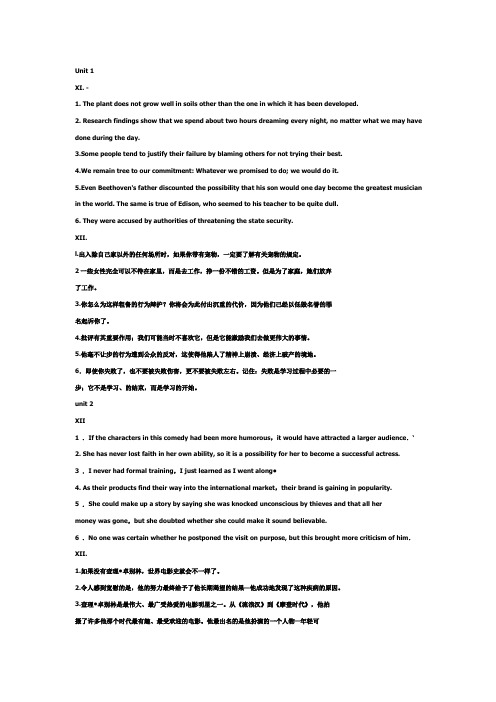
Unit 1XI. -1. The plant does not grow well in soils other than the one in which it has been developed.2. Research findings show that we spend about two hours dreaming every night, no matter what we may have done during the day.3.Some people tend to justify their failure by blaming others for not trying their best.4.We remain tree to our commitment: Whatever we promised to do; we would do it.5.Even Beethoven's father discounted the possibility that his son would one day become the greatest musician in the world. The same is true of Edison, who seemed to his teacher to be quite dull.6. They were accused by authorities of threatening the state security.XII.l.出入除自己家以外的任何场所时,如果你带有宠物,一定要了解有关宠物的规定。
2一些女性完全可以不待在家里,而是去工作,挣一份不错的工资。
但是为了家庭,她们放弃了工作。
3.你怎么为这样粗鲁的行为辩护?你将会为此付出沉重的代价,因为他们己经以低毁名誉的罪名起诉你了。
4.批评有其重要作用;我们可能当时不喜欢它,但是它能激励我们去做更伟大的事情。
新视野大学英语第4册课后翻译全解
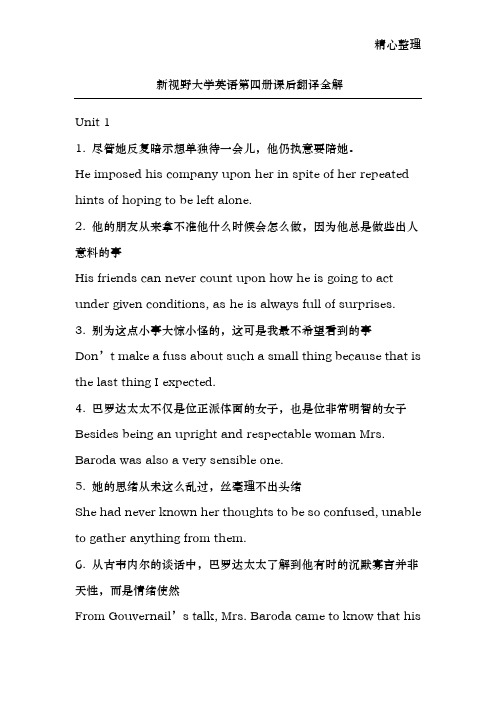
精心整理新视野大学英语第四册课后翻译全解Unit 11. 尽管她反复暗示想单独待一会儿,他仍执意要陪她。
He imposed his company upon her in spite of her repeatedto gather anything from them.6. 从古韦内尔的谈话中,巴罗达太太了解到他有时的沉默寡言并非天性,而是情绪使然From Gouvernail’s talk, Mrs. Baroda came to know that hisperiods of silence were not his basic nature, but the result of moods.7. 令加斯顿高兴的是,他妻子终于不讨厌古韦内尔了,主动提出邀请他再来To Gaston’s delight, his wife had finally overcome hercreator permanent fame.2. 比起其他的国家,就这位科学家而言,中国给予了他更多的掌声,更多的荣誉,当然更多的收益China has provided more applause, more honor and, of course, more profit where this scientist is concerned thanany other countries.3. 他感觉到了一种冲动,要将这个技巧运用得完美无缺He had an urge to execute this skill perfectly.4. 这种对具体事物的发挥转化,以及他一次又一次做出这种转化的技巧,正是卓别林伟大喜剧的奥秘fear of being betrayed. The two were hard to combine and sometimes— as in his early marriages—the collision between them resulted in disaster.7. 尽管她从未对自己的能力失去信心,但她能否进入最佳演出状态还值得怀疑It’s doubtful whether she can find her way into perfect acting, though she never loses her faith in her own ability.8. 令人宽慰的是,他终于在临终前写完了这本被看作其写作生涯最好纪念的书It was a relief to know that he finally finished the book before3. 一年前,那位汽车经销商(dealer)以优质服务来招揽顾客,如今他的生意已十分红火。
新视野大学英语读写教程4完整版答案
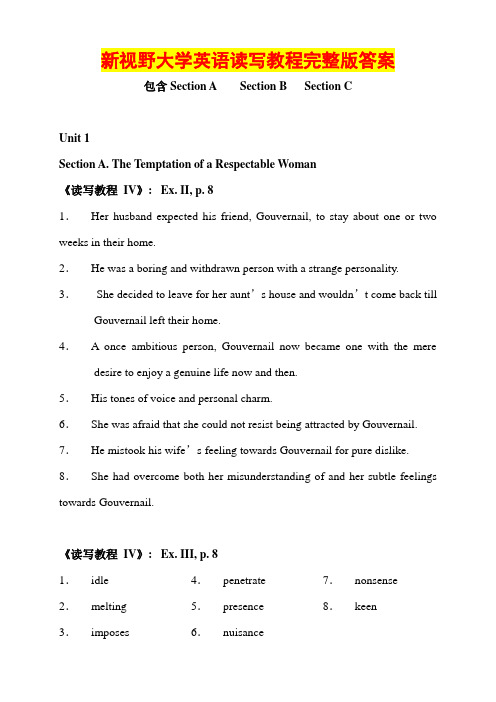
新视野大学英语读写教程完整版答案包含Section A Section B Section CUnit 1Section A. The Temptation of a Respectable Woman《读写教程IV》: Ex. II, p. 81.Her husband expected his friend, Gouvernail, to stay about one or two weeks in their home.2.He was a boring and withdrawn person with a strange personality. 3.She decided to leave for her aunt’s house and wouldn’t come back till Gouvernail left their home.4. A once ambitious person, Gouvernail now became one with the mere desire to enjoy a genuine life now and then.5.His tones of voice and personal charm.6.She was afraid that she could not resist being attracted by Gouvernail. 7.He mistook his wife’s feeling towards Gouvernail for pure dislike. 8.She had overcome both her misunderstanding of and her subtle feelings towards Gouvernail.《读写教程IV》: Ex. III, p. 81.idle 2.melting 3.imposes 4.penetrate5.presence6.nuisance7.nonsense8.keen《读写教程IV》: Ex. IV, p. 91.run down 2.taken seriously 3.drinking in 4.in no sense 5.made excellent observations on 6.counted on7.for my part8.make a fuss《读写教程IV》: Ex. V, p. 91.sanctions 2.Restrictions 3.fine 4.limits5.problems6.tax7.duty8.responsibility《读写教程IV》: Ex. VI, p. 101. justify2. glorify3. exemplifies4. classified5. purified6. intensify7. identify8. terrified《读写教程IV》: Ex. VII, p. 101. bravery2. jewellery3. delivery4. machinery5. robbery6. nursery7. scenery8. discovery《读写教程IV》: Ex. VIII, p. 111. She said it might have been all right, if the weather had been good.2. Mrs. Baroda said she might have liked Gouvernail if he had been like the others.3. If I had been there, I could have helped you.4. He could have got tickets if there had been some cheap ones.5. Mrs. Baroda might have yielded to the temptation if she hadn’t been arespectable and sensible person.《读写教程IV》: Ex. IX, p. 111. “You were different then.”“So was she.”2. “You used to say he was a man of wit.”“So he is.”3. “You’ve made a mistake here.”“Oh, so I have. Thank you.”4. “Children should behave themselves.”“So should adults.”5. “This glass is cracked.”“Oh, so it is. I hadn’t noticed.”《读写教程IV》: Ex. X, p. 121. He imposed his company upon her in spite of her repeated hints of hoping to be left alone.2. His friends can never count upon how he is going to act under givenconditions, as he is always full of surprises.3. Don’t make a fuss about such a small thing because that is the last thing I expected.4. Besides being an upright and respectable woman Mrs. Baroda was also avery sensible one.5. She had never known her thoughts to be so confused, unable to gather anything from them.6. From Gouvernail’s talk, Mrs. Baroda came to know that his periods ofsilence were not his basic nature, but the result of moods.7. To Gaston’s delight, his wife had finally overcome her dislike forGouvernail and invited Gouvernail to visit them again wholly from herself.8. Mrs. Baroda felt confused with Gouvernail’s puzzling nature and found ithard to penetrate the silence in which he had unconsciously covered himself.《读写教程IV》: Ex. XI, p. 121. 在一起呆了几天,她仍感到对这个客人很陌生,只得大部分时间让丈夫陪着他。
- 1、下载文档前请自行甄别文档内容的完整性,平台不提供额外的编辑、内容补充、找答案等附加服务。
- 2、"仅部分预览"的文档,不可在线预览部分如存在完整性等问题,可反馈申请退款(可完整预览的文档不适用该条件!)。
- 3、如文档侵犯您的权益,请联系客服反馈,我们会尽快为您处理(人工客服工作时间:9:00-18:30)。
翻译
XI
1. 无论你的智商有多高,你的看法都受到个人经历的局限,因此要学会吸纳他人有用的观点。
(no matter...)
No matter how high your IQ is, your view is limited by the experience you have had and so you should learn to incorporate
the useful perspectives of others.
2. 这个游戏非常有趣,他们谁也没有注意到时间的流逝。
(Use inverted order of "so... that...";take note of)
So interesting was the game that none of them took note of the passage of time.
3. 我一直在整理这些旧文件,看看哪些有用,哪些需要扔掉。
(sort through)
I've been sorting through these old documents to see which are useful and which can be thrown away.
4. 随着年龄越来越大,你应该考虑未来的计划。
(reflect on)
As you get older you should reflect on future plans.
5. 他在演出中的亮相简直是个轰动。
(nothing less than)
His appearance in the show was nothing less than a sensation.
6. 他们每个月都从工资中留出一笔钱,用于孩子将来的教育。
(setaside)
Every month they set aside a particular amount of money from their salary for the sake of their kid's education in the future.
XII
1. No matter how promising your situation, or how creative you can be, hard work is always essential to your success.
无论你的情况多么充满希望,无论你有多大的创造力,努力工作对你的成功总是必需的。
2. So strong are his first impressions that sometimes they defy revision even when many other people think differently.
他留下的最初印象如此之强烈,有时甚至当许多其他人不这么认为时,这些印象也无法改变。
3. Our aim is nothing less than to make China the best trained and educated nation in Asia.
我们的目的就是要使中国成为亚洲接受培训程度和教育程度最高的一个国家。
4. On international relations China would continue to develop relations with foreign countries in seeking a favorable international environment for its reform and to make contributions to world peace and development.
在国际关系方面,中国将继续发展与外国的关系,寻求一个对自己改革有利的国际环境,继续对世界和平和发展作出贡献。
5. I'll keep at it—whatever the challenges might be—and never give up until I achieve success.
不管会面临什么挑战,我都会坚持,永不放弃,直到取得成功。
6. The latest research seems to imply that without the software of emotional maturity and self-knowledge, the hardware of academic training alone is worth less and less.
最新的研究似乎表明,缺乏情感成熟和自我了解这一软件,纯学术培训这一硬件越来越没有价值。
